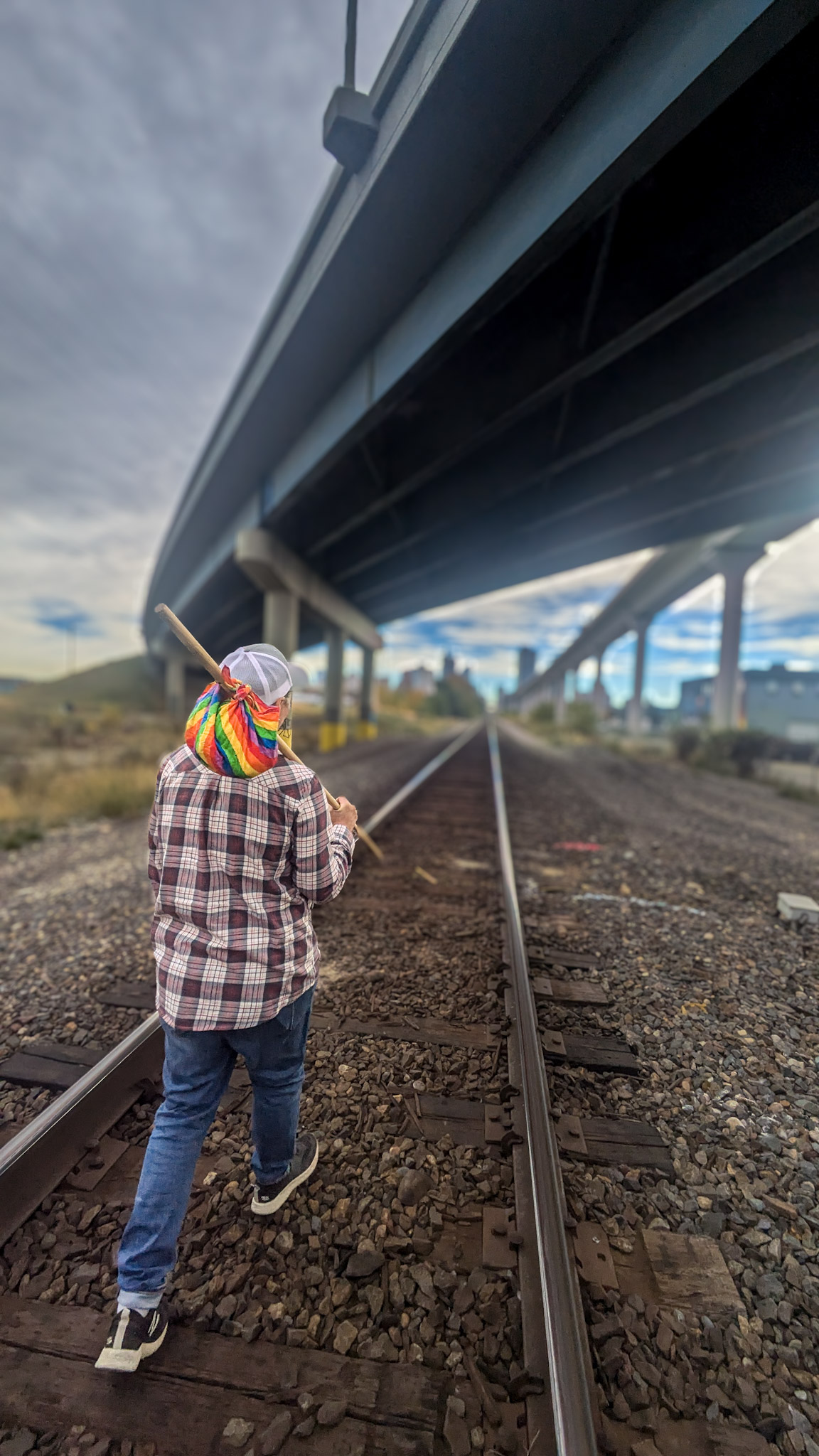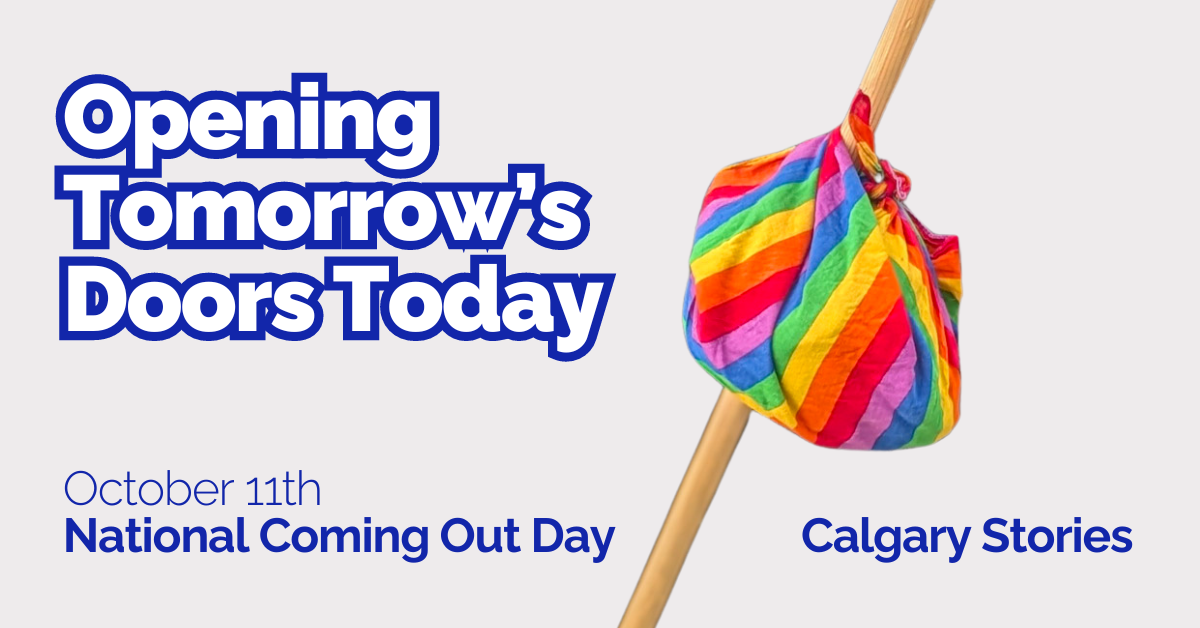Today, on National Coming Out Day, we celebrate the bravery of those who embrace their identities and live openly as part of the 2SLGBTQIA+ community. For many adults, being 2SLGBTQIA+ includes significant challenges, including increased risks of homelessness, poverty, mental health struggles, and discrimination. Transgender and gender-nonconforming individuals, in particular, face severe disparities—they are five times more likely to experience homelessness and mental health issues and seven times more likely to struggle with substance use compared to the general population.
At SafeLink Alberta, we offer vital support to those navigating these unique challenges. Our services provide safe drop-in spaces, housing and healthcare referrals, STBBI education, HIV self-testing, and access to safer substance use and sex supplies. Your donations fund these essential services and ensure that we can continue offering affirming care to those in need. Donate Here to help us open tomorrow’s doors today.
Below, we are featuring people in our community who chose to share their coming-out stories. You can read below:

Charlie: “My relationship with my father, who was supposed to be my rock, now just couldn’t look me in the face anymore.”
Charlie picked his career working with children based on his experience coming out to his parents. Reflecting on his youth, he shares, “I’ve actually come out twice in my life.” Charlie was born female and realized in high school that he was into girls. “I had a huge fight with my biological father over this girl I was caught kissing,” he recalls. “My relationship with my father, who was supposed to be my rock, now just couldn’t look me in the face anymore.” After staying briefly with his mother, Charlie returned to find all his belongings in black garbage bags on the curb. “It’s an image I remember so vividly – coming home to that.” Homeless for two weeks, a friend took him in before he moved into a group home.
Charlie’s struggles didn’t end there. He had to balance school while dealing with anxiety, depression, and the trauma of being sexually assaulted by another resident in the group home. “That just made everything so much more confusing. Why has my whole life turned upside down because I made one simple statement that I thought was true to myself?” However, with the support of his best friend’s family, who adopted him, Charlie found a new sense of belonging. “I was reintegrated into a family that accepted me and was very kind, but it took a lot of work and a lot of extra steps to get there.”
During the COVID-19 pandemic, Charlie had time to reflect and realized he was transgender. “I remember sitting with a group of female friends from university and saying, ‘Do you ever wonder what it’s like to have a penis?’” Realizing those thoughts were unique to him as a trans man, he came out as Charlie. “I was trying the whole gender thing out… then just was like, you know what? F*** it. He/him.” Now four years into his transition, Charlie says, “It has been the most wonderful, life-improving experience.” Recently married, he adds, “My adopted mother picked my new name. That’s how I got Charlie, which felt like a full-circle moment.” His message to others: “Be true to yourself… no matter who doesn’t accept you or how fast or slow the process is. It’s not going to change who you are.”
Why has my whole life turned upside down because I made one simple statement that I thought was true to myself?
Charlie
Later in Life Lesbian: “I was 100% myself. All the good, the bad, the ugly—the things I would have hidden before or tried to change, none of that.”
Later in Life Lesbian chose her title thoughtfully – after coming out in her late 30s. Following a divorce, she realized she might be gay but wrestled with the idea. “I wasn’t sure if maybe I was just fearful of relationships with men and therefore the only other option was women. It took me a while to figure that out mentally and emotionally. And when I realized that wasn’t the case, then, yeah, I didn’t really know what to do or where to go.” She found herself grappling with how to navigate dating again. “Dating is terrifying. The idea of dating a woman was extra terrifying.”
Her long-time connection to the queer community, particularly the drag scene, became a source of comfort. “Of course they were like, ‘Oh girl, you are gay,’” she said with a laugh. However, coming out to her family was a different challenge. “There were two groups of people that I was terrified to talk to, and that was my kids and my parents.” Her parents, whom she described as “incredible,” were fully supportive. When she came out to her young children over dinner, their reaction was equally accepting. “They were like, ‘Cool,’ and just kept eating their pasta.” This unexpected ease made her reflect on others who might face rejection. “If I was terrified, imagine how terrified they would be.”
Later in Life Lesbian eventually met her long-term partner, and their connection was immediate. “It’s stupid and cliché, but literally when I walked into the restaurant, it was like sparks crazy, which I never felt with any man ever.” She feels fully herself in this relationship. “I was 100% myself. All the good, the bad, the ugly—the things I would have hidden before or tried to change, none of that.” For those in similar situations, she has a message of hope. “There is a huge community… when you find it, they will just accept you. You can sort of try it all on and see what fits.”
Help Us Open Tomorrow’s Doors Today
Hanako: “You don’t have to have known who you are since childhood…Even if your [understanding of] identity shifts later, that’s totally fine!”
Hanako, a biracial, Queer, and Trans person with a passion for astrology and medieval sword fighting, recalls their coming-out journey as a series of moments, not just one. In high school, they came out as a lesbian. “I’m a girl and I love other girls,” they said humorously. Hanako often brought up their identity in a casual and humorous way until one day their dad realized, “Wait a second. You’re being legit.” Their parents were immediately relaxed and accepting. “They did not give a flying f***,” Hanako shared, reflecting on how humor helped ease the situation, making it “super fun and chill.”
As a young adult, Hanako volunteered at Calgary’s Camp Fyrefly, where meeting other non-binary people in person shifted their understanding of their identity. “I was on Tumblr, so I knew what non-binary was, but meeting non-binary people in real life changed things,” they explained. They gradually began changing their pronouns, landing on “they/them.” Hanako avoided a formal coming-out moment with their parents, instead they tried to ease into the change. Their mom, whose first language is Japanese, struggled at first with the pronoun shift. “Pronouns aren’t a thing in the same way in Japanese—you use names more,” Hanako remarked. Despite the language hurdles, their mom eventually embraced it, even correcting others when necessary: “My mom will be like, ‘Actually, non-binary, they,’” Hanako recalled warmly.
When Hanako decided to pursue gender-affirming surgeries, they asked for support from their parents. “I’m finishing university soon, so it’s the perfect time to take time off for surgeries,” they explained. Their parents were fully supportive, and Hanako’s mom had an emotional reaction, saying, “I just wish I knew how much discomfort this brought you.” Reflecting together, Hanako’s mom remembered a meltdown in Walmart when they tried on their first bra, a moment that now made sense to both of them. While Hanako hasn’t come out in the same way to their extended family, they emphasize the validity of self-discovery and fluidity. “You don’t have to have known who you are since childhood,” they said. “Even if your [understanding of] identity shifts later, that’s totally fine!”
About SafeLink Alberta
SafeLink Alberta is a non-profit organization that has been serving and advocating for priority populations in Calgary and southern Alberta since 1983. Our mission is to reduce the harms associated with sexual activity and substance use through education, non-judgmental services and programming.
We believe that everyone deserves access to healthcare services, regardless of their background or lifestyle. That’s why we prioritize underserved communities and those who are most at risk for HIV, hepatitis C, and other sexually transmitted and blood-borne infections.
Our services include HIV, syphilis, and hepatitis C testing, emotional support, support groups, and referrals to other healthcare providers. We also offer supplies and education on safer sex practices, drug use, and overdose prevention.
Our team is made up of passionate and dedicated individuals who are committed to making a positive impact in our community. We work closely with other organizations and community partners to ensure that our services are accessible and effective.
At SafeLink Alberta, we believe that everyone deserves to live a healthy and fulfilling life, and we are here to support and empower our clients every step of the way.

